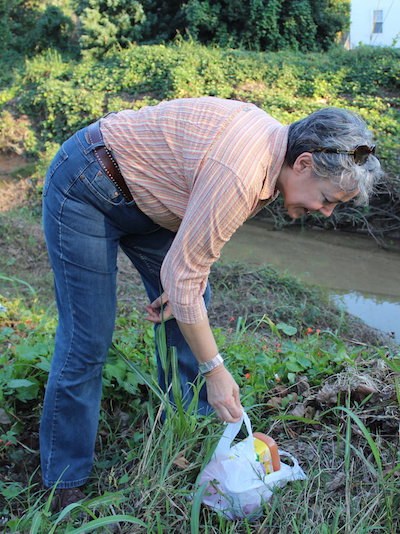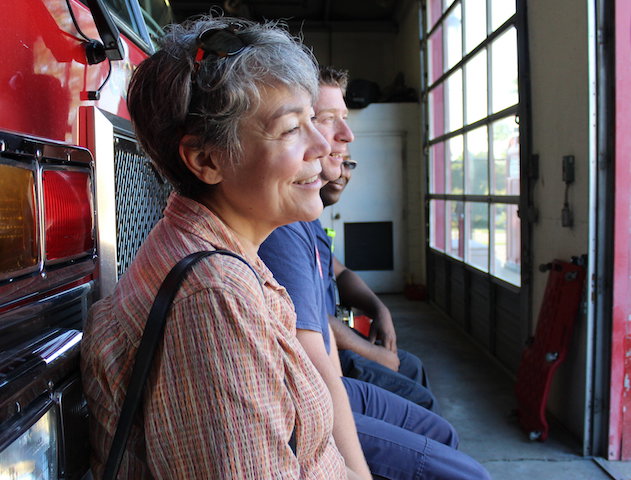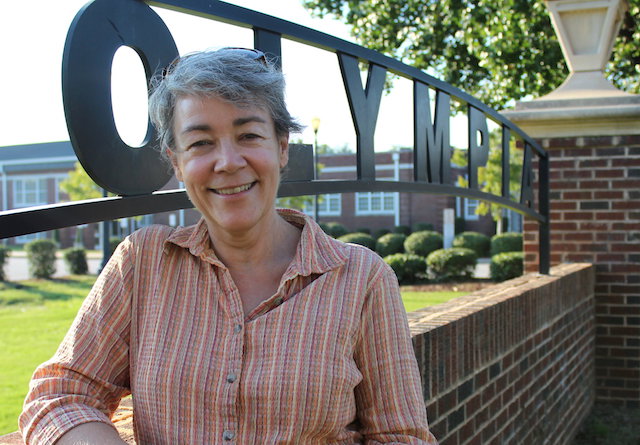Viola Hendley fights for a better Olympia
by Reporting Students • November 18, 2015 • All Stories, Neighborhoods, People • 0 Comments
Conflict doesn’t scare Olympia’s Viola Hendley. She started the Olympia Residents Council in 2013 to address multiple neighborhood problems and often spends extra hours finding solutions. Now, she plans to spend even more of it on Olympia as she nears retirement.
By Andrew Moore
Nov. 18, 2015
When she’s not in a classroom teaching, Viola Hendley is looking out for her Olympia neighborhood, pushing for improved public services, meeting with residents and keeping an eye on the environment.
Hendley, who moved to Olympia in 1984, started the Olympia Residents Council two years ago after seeing a sudden increase in neighborhood problems, including absentee landlords. She knew that residents “needed to have a voice.”
“My neighborhood started going to hell,” Hendley said. “So we started some initiatives that have been very helpful.”

Viola Hendley picks up litter near Rocky Branch Creek in Olympia. She says the creek has been an ongoing effort since she moved to Olympia, and that more cleanup events will be held in the future.
Starting an effective neighborhood association was easy for Hendley. She started the Olympia Residents Coalition in 2000, which resolved multiple neighborhood issues. The group even occasionally teamed up with We Are Olympia, another organization in the neighborhood.
Those who work with Hendley say she’s more than just a problem-solver.
“She’s just so passionate and dedicated to the environment. And she’s a fighter who really wants to get things done,” Congaree Riverkeeper Bill Stangler says.
For an hour each month, Hendley meets with Olympia residents at 701 Whaley to address neighborhood issues. For the rest of the month, her husband, Scott, said, she spends a lot of personal time finding solutions.
Recently, for instance, she took three days off from teaching students with autism to attend a fire station design conference in North Carolina with Columbia officials. For years, Hendley has advocated replacing Olympia’s 20-year-old Fire Station 2.
Hendley is also on the Congaree Riverkeeper board and a member of the Rocky Branch Watershed Alliance, and she says she has spent many weekends cleaning Rocky Branch Creek, which runs through Olympia.
Hendley also attends most Tuesday-evening Richland County Council meetings to speak about or check for issues regarding Olympia, which is a “doughnut hole,” part of the county surrounded by Columbia.
“I’m a driven person,” she said. “And Olympia is a lifelong effort.”
Links
|
It’s not unusual for neighborhood leaders to spend more than 200 hours a month on their work, said Matthew Baggetta, a civil society expert at Indiana University. Retirees make the best leaders because they have more time to address issues, he said.
Hendley, 57, plans to retire soon after 35 years of teaching, giving her even more time for Olympia. We talked with her about the challenges of being a neighborhood president for one of the Midlands’ oldest mill villages. This excerpt has been edited for length and clarity.
(Listen to the full podcast)
When you moved into the neighborhood, would you say you were as active as you are now?
Yes, I’d say so. In 2002, a matter-of-fact, we formed a group called the Olympia Residents Coalition, which worked along with We Are Olympia to see that the Vulcan Quarry trucks were taken off Olympia Avenue and put onto South Rosewood Drive. So we worked really hard at that. But you know, life kind of happened and folks moved on. And I became somewhat complacent myself and had not been active for a while.
So what influenced your decision to start the Olympia Residents Council almost 11 years later?
The neighborhood had really fallen prey to absentee landlords, residents just being complacent, much like myself. There are county codes and ordinances that really allow for blight to occur. Things such as you can leave your trash carts in your front yard, you can have bedroom furniture on your front porch, and these aren’t against any codes or ordinances. Transients in our park that would raffle through our trash. And scared families, they wouldn’t come to the park and play, and we have a beautiful playground. Lack of law enforcement, kind of a benign neglect of the area. And the need for traffic control and sidewalks. Also, a good friend of mine, Ryan Nevius with Sustainable Midlands, kind of encouraged me to get up off my butt and do something about it, so I did. …

Viola Hendley sits down with firefighters at Fire Station 2 on Ferguson Street to discuss problems with the facility.
What does a typical schedule look like for a neighborhood association president? …
You work full-time, you get off work, you hit the email train, you make phone calls. … It’s constant.
Well, can you tell me about your most recent efforts in the neighborhood?
Yeah, probably the one that I’m most excited about is working alongside with We Are Olympia to see that sidewalks come our way. We’ve actually talked about their taking the lead. And that’s really good because that takes one thing off of our plate. So I’m really excited about that.
Working together with USC Off-Campus Student Services to address student behavior in the neighborhood. I think kids come from home and they’re just ready to let loose and don’t recognize that they’re moving into a neighborhood not. I’m not sure what they think they’re moving into. But there’s need sometimes to try to mediate between neighbors who’ve lived here for a long time and the student pop. And it’s been pretty successful. We’ve been pleased with the university’s response.
Let’s see, the firefighters, trying to see that they have a decent quality of life while we work on trying to get them a new station built.
You’ve said before that the most time-consuming effort has been the new fire station. And that you’ve been spending years on it. Why do you think the fire station needs to be replaced? …
The station was built as a knee-jerk reaction to a chemical fire back in the early 1990s. Recognizing they didn’t have fire service down here, they put it in an old flower warehouse. And the firefighters actually built it out. … And when I visited it for the first time, I just wouldn’t have let my dogs live in it. That’s just awful. … And these are the folks who are charged with our safety and they’re heroes. So I can’t see why we would treat them like that. …
What do you think drives you to dedicate your own time to solving these issues?
It’s like a hobby, I don’t know … I enjoy the challenge. I like to find solutions, and I like to the see the fruits of those efforts.

